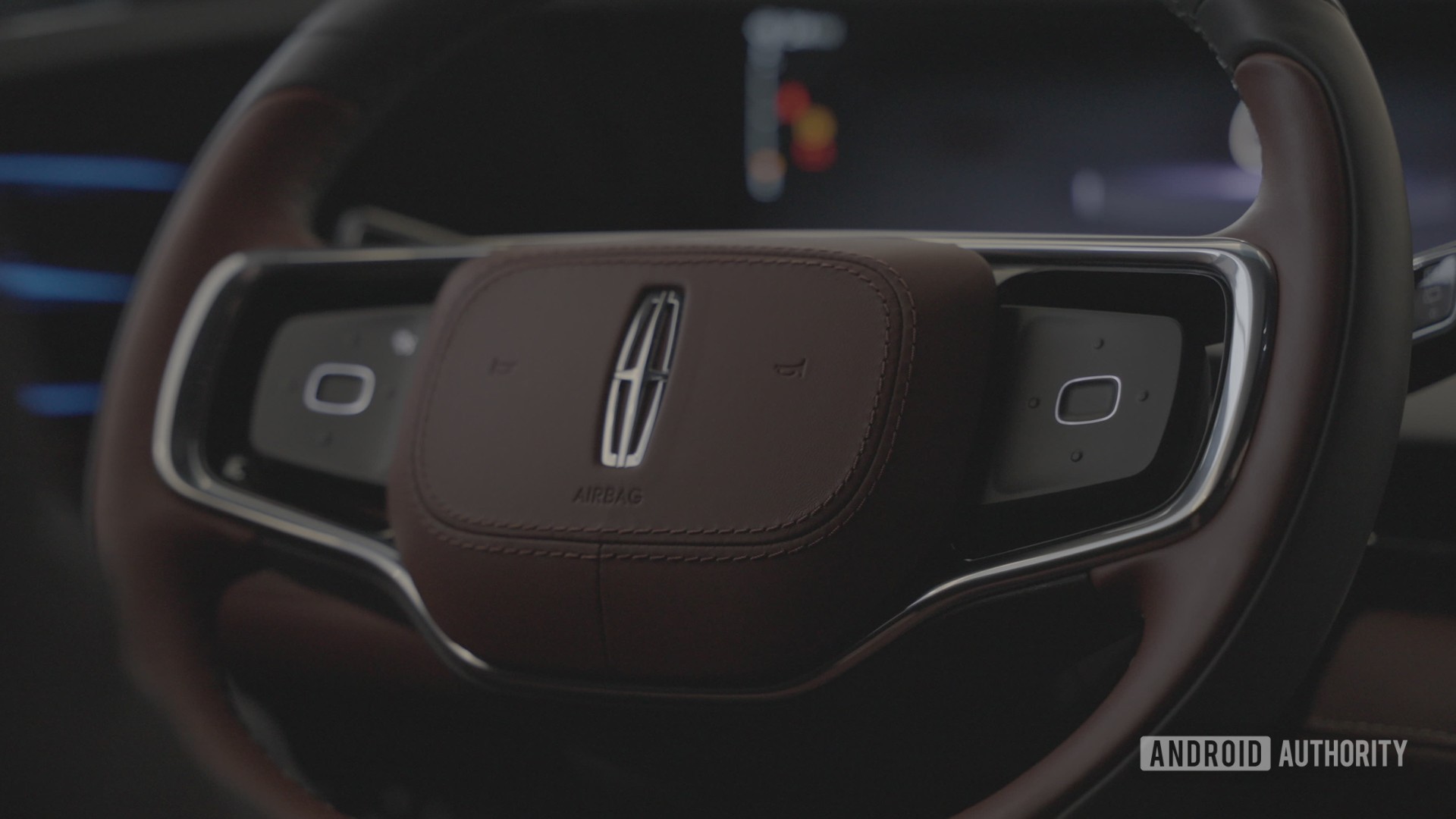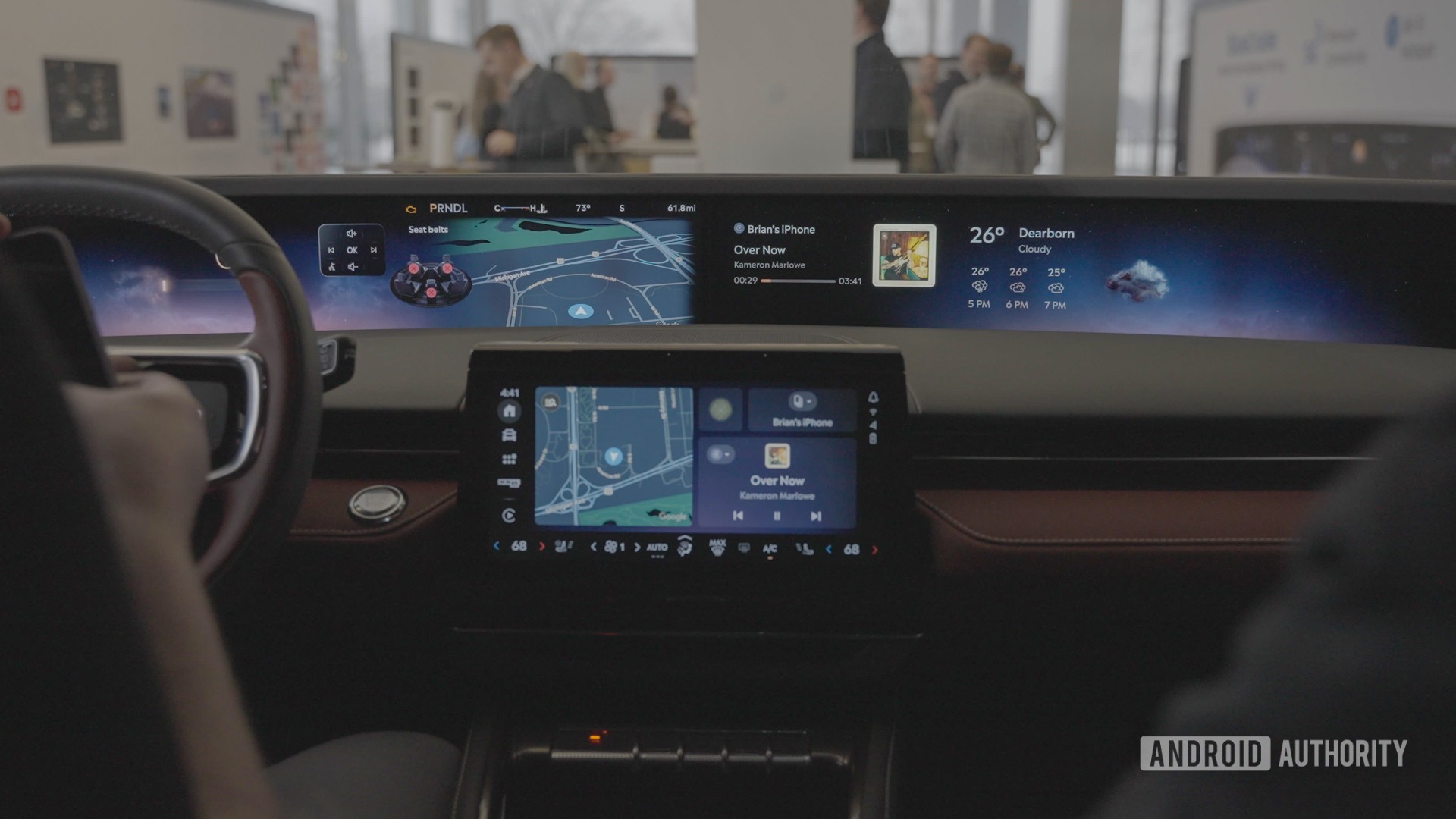Affiliate links on Android Authority may earn us a commission. Learn more.
Ford's new in-car experience is built around the Play Store and Android Auto
Published onJanuary 22, 2024
Ford just introduced a brand new digital driving experience for both its Ford and Lincoln car brands. The long-standing American automaker is merging both the infotainment system and the instrument cluster under the same computing module, which is powered by Android and Google but also intriguingly supports Apple CarPlay and Amazon Alexa.
Ford says this new Android-powered experience will allow it to deliver a human-centered interface, faster updates, and access to plenty of third-party apps and games — when you’re parked, of course.
We went hands-on with it, and we’ll be honest: It feels closer to the bridge of the USS Enterprise than it does to the dashboard of a family car.
Ford built a 3-in-1 experience with a primary Android system, plus Android Auto and CarPlay support for those who prefer it.
The new Ford digital experience is like a 3-in-1 platform. The primary Ford experience is Android-based; Google used to call this “Android Automotive” but is now referring to it as “Google built-in.” Ford brought a lot of the development in-house, though, to fine-tune the experience and get it to run better on the central console and on the sweeping 48-inch panoramic display up top. The Android-based platform lets you download and update individual apps through the Play Store right from the console of your car — a good departure from infotainment systems that require a full update to fix some bugs in one app.

If you prefer to use your phone, though, Ford’s new digital experience supports both Android Auto and Apple CarPlay, which means you have a lot of freedom with your operating system. Not only that, but it also supports three different voice assistants, whether you want Google Assistant, which is the default, Apple’s Siri, or Amazon’s Alexa. The latter can control some in-car functions too, like setting the in-car temperature.
One of the main reasons for this level of voice control flexibility is that Ford wants to make the entire experience voice-first. After all, it’s easier to deliver commands with your voice and activate your assistant with a press of the button on the steering wheel instead of fiddling with screens and buttons.
Google Assistant, Apple Siri, and Amazon Alexa are all supported in this voice-first experience.
However, the real star of the show is the new panoramic display. It’s a 48-inch 4K display with 1,000 nits of brightness that breaks down your information into three simple zones: Ford’s Essentials, the Supporting Information, and the things you need at a glance.

The Essentials on the left (behind the steering wheel) are what you’re used to seeing in any car dashboard: your remaining range, your speed, the temperature inside the car, and some other basics that the driver needs in front of them. The Supporting Information in the middle is mostly just your navigation panel, whether it’s Google Maps or Apple Maps. Once again, Google Maps is the default, but if you open Apple Maps through CarPlay and start navigating, your car will automatically adjust to bring the map front and center so you have the most accurate directions all the time. This should happen with third-party navigation apps too, like Waze for example.
At the far right, you’ll see customizable widgets of everything you might need at a glance. This includes music (Spotify, Amazon Music, Audible, iHeartRadio, and SiriusXL among others), weather forecasts, and more.
The 48-inch panoramic display mixes essential car dashboard metrics, navigation, and glanceable widgets.
As mentioned, Ford’s new digital experience relies heavily on the Google Play Store. With that in mind, there are some partnerships that Ford has in place, like Asphalt Nitro (after connecting a Bluetooth controller) and certain video conferencing apps. If you’re waiting in line to pick up your kid from school, but you need to hop onto a quick work call, you’ll be able to do that. For work calls, video feeds will be available when you’re parked, but the car will switch to audio-only calls when you’re driving. Ford is actively working with different developers to fine-tune their apps for the connected driving experience, so you’ll be able to open them on your console and see them on the panoramic display.
We also had a chance to check out certain demos using apps like Netflix and PBS Kids, but again, any app that requires this level of interaction is only going to be accessible when you have the car set to park.
During our demo of Ford’s new digital driving experience, everything seemed to run really smoothly. It was easy to navigate and add widgets or remove widgets from the panoramic display, and the list of supported apps is only going to keep growing. Prime Video, YouTube, the Vivaldi browser, and even Chrome will also be available.
In the meantime, you’ll see Ford’s new experience come first to the all-new Lincoln Nautilus in 2024, followed by other Ford and Lincoln models down the line. Expect to pay a monthly fee for the Ford or Lincoln Premium Connectivity plan, which gives your car the 5G access it needs to run all of this functionality.
You can check out our hands-on video at the top of the page or read more on Ford’s dedicated website.